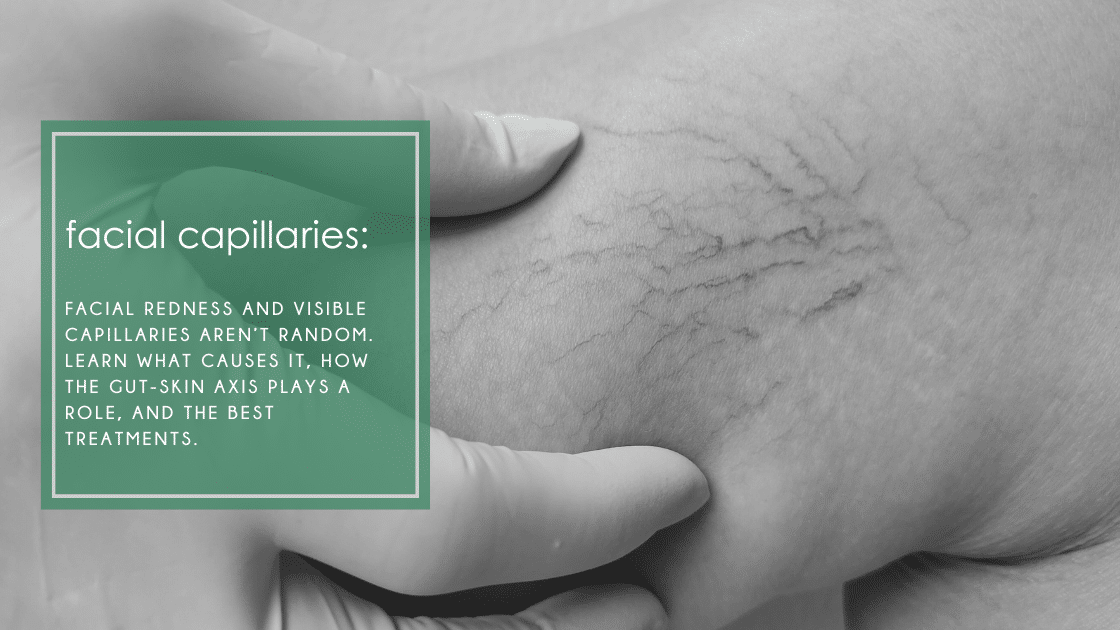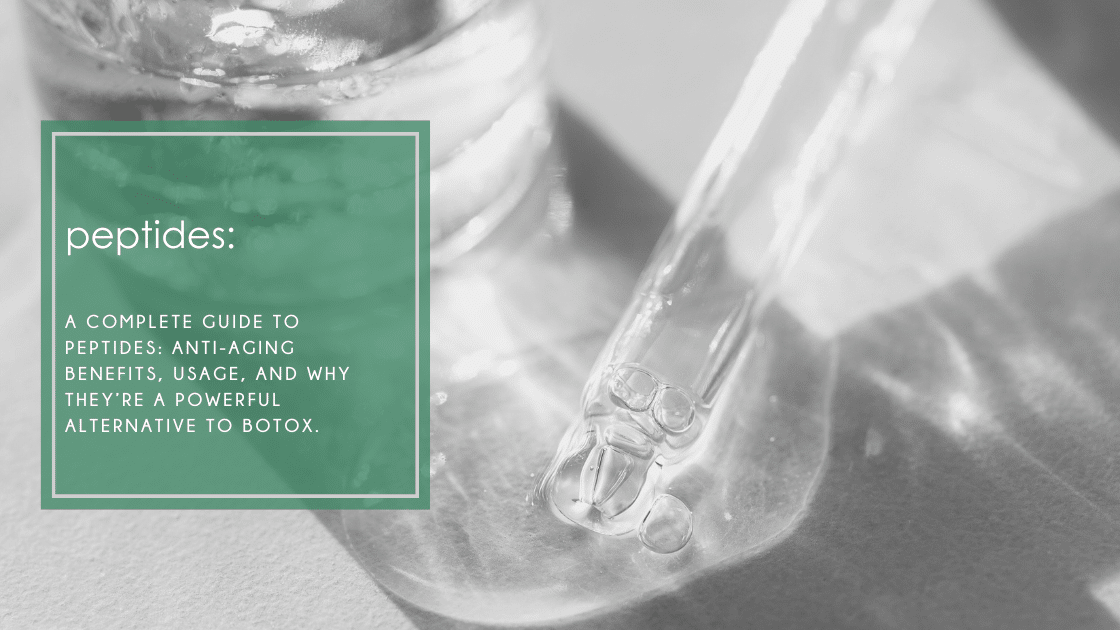Reactive Skin: Why More People Are Sensitive
Reactive Skin: The Real Reason and How to Fix It Fast
What is Reactive Skin?
“Reactive skin” isn’t a medically defined term, but it’s becoming a common concern in the skincare world. More clients than ever are reporting irritation, redness, and unexpected breakouts; even when using gentle products. This “new normal” makes us start to dig a little deeper to understand why more people nowadays are suffering from skin reactions than ever before. Today’s blog is going to cover the root causes of reactive skin, how it differs from sensitive skin, and what you can do to keep your complexion calm, balanced, and healthy. Let’s dig in!
Reactive Skin vs. Sensitive Skin
Reactive skin is a newer term used to describe skin that becomes overly sensitive to anything you apply, even gentle products like hyaluronic acid or hydrating moisturizers. Symptoms often include the skin becoming red, angry, burns, peels, flakes, or rash-like irritation. According to Skin Inc Magazine, “Reactive skin may include genetically sensitive skin, acne-prone skin, skin with allergies, irritant reactions, ingredient sensitivities, rosacea and redness-prone clients. These clients seem to have a lot of problems finding products or treatments that don’t cause problems for their skin.”
Sensitive skin, on the other hand, is typically linked to allergic reactions or environmental triggers. This is a skin condition that causes sensations such as burning, itching, redness, and inflammation. Sensitive skin occurs in response to applying a lotion, cream, or cleanser due to an allergic reaction. According to Skin Inc Magazine, “Sensitive skin can be a side effect of the overzealous consumer who engages in weekly microdermabrasion, lunchtime face peels and nightly retinoids. All of these procedures and products damage the skin barrier, which produces sensitive skin over time. The solution to the problem is to simply discontinue the damaging activities and let the sensitive skin self-resolve.”
Dry vs. Dehydrated Skin
Dry Skin is a common skin condition; however, if left untreated, dry skin can cause the skin to become sensitive or reactive. True dry skin is genetic, characterized by having minimal pores, little oil production, very pale skin, and sunburns. As we age, cell turnover slows and menopause begins, causing the skin to become dry due to a lack of estrogen production.
Dehydrated Skin, however, is a temporary condition caused by a compromised skin barrier. If you’ve ever felt your skin and it looks dry or flaky, but is oily to the touch, your skin is likely dehydrated. This means something you’re doing/using is removing water, so your oil glands become activated as a protective mechanism. This causes clogged pores, acne, or those annoying white bumps under the skin, also known as trapped oil. If left untreated, dehydrated skin can cause the skin to become reactive to acids, scrubs, harsh cleansers, or exfoliants.
Acquired Sensitive Skin
Acquired sensitive skin often overlaps with reactive skin. Within our skin cells, there is a “glue” that holds the cells in place. This glue is composed of lipids, a complex that fills the spaces between cells and helps retain water in the skin. Lipids block harmful substances from entering the body, acting as a barrier to lock in moisture and keep harsh irritants out.
As mentioned above, when we talk about sensitive skin, harsh skincare products, exfoliants, or acids deplete lipids. Skin Inc Magazine describes this, “When irritants penetrate the epidermis, immune function is initiated, resulting in redness as well as potential histamine reactions, such as urticaria and swelling. Repeated exposure to the exfoliants and surfactant cleansers continue to further injure the lipid barrier and increase the severity of the symptoms.”
How Does Stress Impact Reactive Skin?
Stress can manifest in many different ways. It is a physical and psychological response to an internal or external stressor, which triggers a “fight or flight” response in the body. impacts our nervous system and can cause a host of problems. According to Rupa Health, “Stress can significantly impact our skin health, and its effects manifest in various ways. One such way is through its interaction with the gut, often referred to as the ‘gut-skin axis.’ Stress may disrupt the gut’s normal function, leading to a condition known as ‘leaky gut.’ This, in turn, can contribute to skin inflammation as inflammatory substances escape into the bloodstream.”
Skin Barrier
Think of your skin barrier as a shield protecting you from toxins, pollution, and bacteria. It is a detox organ, which means it lets toxins from the body through our pores. It’s designed to let toxins out through sweat, and not allow them in.
Healthy Skin Barrier vs. Damaged Skin
Imagine your skin is a brick wall. The skin cells are the bricks, and oil, ceramides, and cholesterol make up the mortar holding it all together. Healthy skin is like a brick wall on a brand-new house; the bricks are perfectly lined up. Now, picture an old building with a broken-down brick wall; there are cracks in the bricks, the mortar has broken off in some parts, and there are holes in some of the bricks. This is what a damaged skin barrier looks like. When your brick wall becomes cracked from over-exfoliation, pollutants, or harsh chemicals, this creates microscopic tears in the skin. Your skin becomes vulnerable, leading to breakouts, dryness, and reactive skin
Will My Skin Repair Itself?
Yes, but it takes time. The skin renews itself every 28-40 days, depending on your age and amount of skin damage. Healing your skin barrier is not an overnight fix, but with the right products and support, you’ll begin to see changes in 4-6 weeks.
How To Repair Your Skin Barrier
The best way to repair your skin barrier is to simplify your skincare routine. Use soothing, nourishing products that strengthen the skin rather than strip it.
PRO TIPS:
Cleanser: A cream-based or oil-based cleanser twice a day
Exfoliate: A gentle gommage or enzyme exfoliant once a week
Moisturize: We recommend a lightweight lotion for oily or acne-prone skin and richer formulas for dry skin or sensitive skin.
How to Heal Without Clogging Pores
You don’t need thick, heavy skincare products to heal. In fact, when your barrier is strong and healthy, you don’t need heavy products, because Once your barrier is balanced, your oil production stabilizes naturally, reducing breakouts and clogged pores. Your oil production naturally balances out, reducing clogged pores and breakouts. Remember “less is more” when it comes to your skincare.
How to Heal Reactive Skin From the Inside Out?
Beautiful skin starts from within. Healing your skin barrier isn’t just topical; it starts inside the body. We don’t associate skin problems with an unhealthy body. Lifestyle changes play a huge part in our health. The good news is, your skin will respond and thank you.
Here’s how:
- Eliminate inflammatory foods, such as anything pre-packaged or processed, sugar, gluten, and dairy.
- Stay hydrated, increase your water intake, and eliminate soda and caffeinated drinks
- Increase your protein intake. Red meat is a complete protein and increases your amino acids, iron, and vitamin levels
- Get plenty of rest, aim to sleep 6-8 hours a night, so your body repair itself
- Add mindfulness to your life, such as 5 deep breaths before bed, walking, journaling, yoga, or meditation
Ready To Get Started?
If you want to learn how internal factors impact the skin, please listen to our new podcast, The Functional Aesthetician, where we talk about the gut-skin axis, hormones, plus tools to help you get started today. To book your next facial and let us help you calm your skin down and simplify your skincare routine, please click here to visit our website today.
Any questions? Drop them in the comments below.




